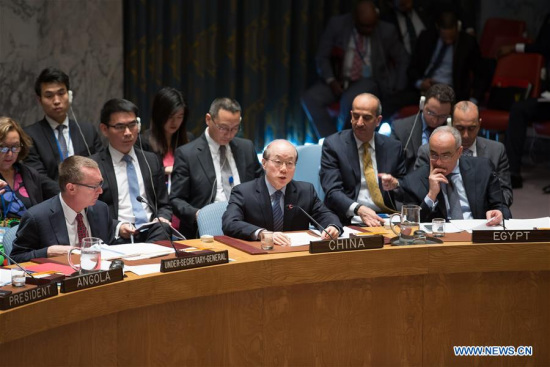
Liu Jieyi (C, front), China's permanent representative to the United Nations, speaks after the Security Council adopted a resolution on the Democratic People's Republic of Korea (DPRK) at the UN headquarters in New York, March 2, 2016. (Photo: Xinhua/Li Muzi)
The fresh UN sanctions adopted Wednesday on the Democratic People's Republic of Korea (DPRK), though widely believed to be tougher than ever, are not intended to affect DPRK people's livelihood as the document contains language allowing for humanitarian exemptions.
The 15-nation Council unanimously adopted a resolution that approved a set of harsh sanctions in response to the DPRK's latest nuclear test and satellite launch.
The resolution broadens the scope of the financial sanctions and the scope of the arms embargo. It also includes a ban on all exports from the DPRK of coal, iron, iron ore, gold, titanium ore, vanadium ore and rare earth metals, and a prohibition on the supply to the DPRK of all types of aviation fuel, including rocket fuel.
The document underlines that measures imposed by relevant Security Council resolutions "are not intended to have adverse humanitarian consequences for the civilian population of the DPRK," or to affect negatively the work of relevant organizations that carry out assistance and relief activities in the country.
Throughout the document, it contains measures aimed at limiting negative humanitarian consequences by including exemptions for livelihood or medical purposes in the written sanction measures.
To illustrate, the resolution requires that all states shall inspect on their territory all cargo going to or coming from the DPRK via land, sea or air. Meanwhile, it calls upon states to carry out inspections in a way that minimizes impact on the transfer of humanitarian relief cargo.
On banning all exports from the DPRK of coal, iron and iron ore, the resolution said this provision shall not apply with respect to transactions that are determined to be exclusively for livelihood purposes and unrelated to generating revenue for the DPRK's nuclear or ballistic missile programs.
Besides, the Council decided that states shall take measures to close representative offices, subsidiaries, or banking accounts of financial institutions if their financial services could contribute to the DPRK's nuclear or ballistic missile programs.
And it decided further that this provision shall not apply if such offices, subsidiaries, or accounts are required for the delivery of humanitarian assistance.
Hong Lei, a Chinese Foreign Ministry spokesperson, said on Friday at a daily news briefing that the Security Council sanctions should not affect the everyday life of people in the DPRK.
The UN Security Council's resolution cannot fundamentally solve the nuclear issue on the Korean Peninsula, and relevant parties need to return to dialogue and negotiation, said Hong.
Echoing this point, the resolution calls for a resumption of the six-party talks, a multi-lateral dialogue mechanism brokered by China in efforts to seek a peaceful solution to the nuclear issue on the Korean Peninsula. The talks also involve the United States, Russia, Japan, as well as the two sides on the Peninsula.
While reiterating "the importance of maintaining peace and stability on the Korean Peninsula and in northeast Asia at large," the resolution expresses the council's commitment to a peaceful, diplomatic and political solution to the situation.
In a series of violations of relevant Security Council resolutions, the DPRK conducted its fourth nuclear test on Jan. 6 and launched a satellite on Feb. 7 which is widely believed to have used ballistic missile technology banned by previous UN sanctions. Pyongyang said it was a peaceful satellite launch.
The DPRK has previously conducted three nuclear tests in 2006, 2009 and 2013, respectively.
Right after the DPRK's first nuclear test, the Security Council adopted a resolution to impose sanctions on the DPRK and set up a sanctions committee.
In response to the nuclear tests conducted by the DPRK in 2009 and 2013, the Security Council has adopted another three resolutions to strengthen various sanctions against the DPRK, which include an arms embargo, an embargo related to nuclear, ballistic missile, and a ban on the export of luxury goods.


















































